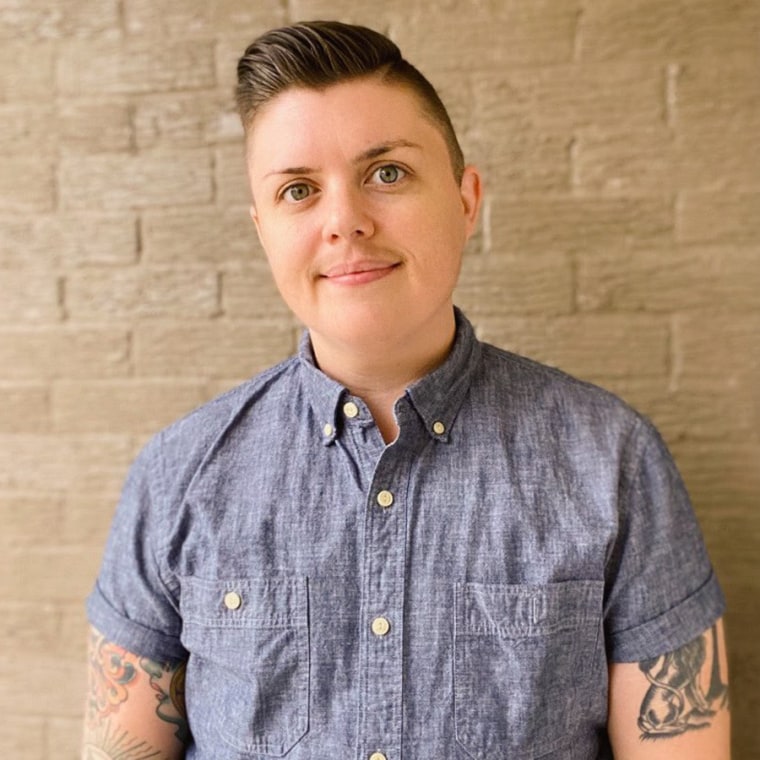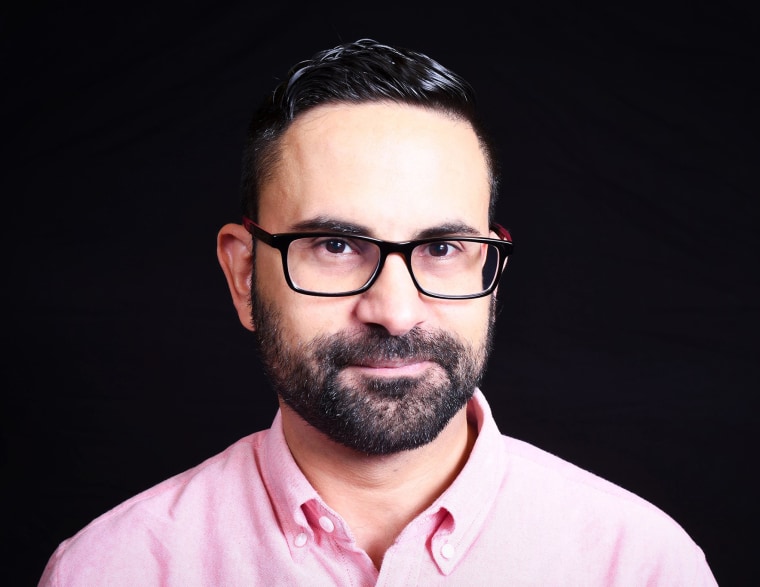What LGBTQ Advocates Want from Biden’s First 100 Days
Devyn Box, 36, a social worker in Dallas, avoids going places in Texas where IDs have to be shown, because Box’s lists their sex assigned at birth rather than their nonbinary gender.
Nineteen states across the U.S. allow nonbinary residents to use an “X” mark for gender on state IDs, like driver’s licenses, though Texas is not one of them. Box, who uses gender-neutral pronouns, said a federal policy that would allow them and other individuals who identify as neither exclusively male nor female to receive an accurate ID would make a huge difference in their daily quality of life.
“On my mortgage, I had to put the wrong gender, because they wouldn’t let me select my actual gender,” Box told NBC News. “I’ve had situations where people are going on what’s on my ID, and so then I have to basically out myself to them if I want for them to speak to me respectfully, which can be unsafe, and it’s also just uncomfortable and exhausting having to continuously educate and advocate for myself.”

In Joe Biden’s plan to “advance LGBTQ+ equality in America and around the world,” which is on his campaign website, the president-elect said he “believes every transgender or non-binary person should have the option of changing their gender marker to ‘M,’ ‘F,’ or ‘X’ on government identifications, passports, and other documentation.” As a result, he vowed to support state and federal efforts that permit trans people to have IDs that accurately reflect their gender identity.
Box said they hope the Biden administration will push for a federal rule in its first 100 days, because they don’t plan to move out of Texas anytime soon, and they don’t expect the state to pass its own legislation. Until then, Box said they will continue to feel unsafe and experience hostility from people while explaining their identity.
“I don’t want to make it a big deal, like I just want to exist and not have to give this any thought,” Box said. “I just feel like if I had an ID that matched who I am, that I could possibly cut down on the number of times that I have to experience that. But it’s just kind of unavoidable everywhere I go.”
Last March, during the Democratic presidential primary race, Biden released an ambitious plan to advance LGBTQ rights, but at the time it was unclear what he would realistically be able to accomplish if elected with a Republican-controlled Senate. But now that Democrats will narrowly control Congress and the White House for the first time since 2011, many of Biden’s LGBTQ proposals appear much more achievable.
LGBTQ people and advocates are gearing up to hold Biden to his promises in the first 100 days of his presidency. Some, like Box, want to see federal ID legislation, which the American Civil Liberties Union is pushing for Biden to institute via an executive order. Others want him to immediately undo the ban on transgender people serving in the military and a variety of other Trump administration policies that rolled back protections for LGBTQ people. Advocates would also like to see Biden pass federal discrimination protections, among other legislation.
The Equality Act
In May 2019, the Democrat-controlled House passed the Equality Act, a sweeping bill that would grant LGBTQ people federal protections from discrimination in employment, housing, credit, education, public space, public funding and jury service. The legislation, however, was never given a vote in the Republican-led Senate.
“With Mitch McConnell in charge of the Senate, there was no chance we would ever get a vote on any of our stuff,” Mara Keisling, executive director of the National Center for Trans Equality, said of pro-LGBTQ legislation.
With McConnell, R-Ky., in a minority leader role, the bill faces fewer barriers.
“The opportunity that we have to pass the Equality Act is better now than it’s ever been before,” said Alphonso David, president of the Human Rights Campaign, the country’s largest LGBTQ advocacy group. “This should be a part of our civil rights laws.”
Addressing a four-year ‘onslaught of attacks’
Advocates also expect Biden to deliver on his promises of immediately undoing Trump policies that targeted LGBTQ people with executive orders or new guidelines.
Recommended
OUT POLITICS AND POLICYWhite House website allows users to specify pronouns for first time
OUT POLITICS AND POLICYBiden issues executive order expanding LGBTQ nondiscrimination protections
“The past four years has resulted in an onslaught of attacks against the LGBTQ community,” David said, citing as examples the administration’s push to allow women’s homeless shelters to turn away transgender women and health care providers to refuse service to LGBTQ people during a pandemic.
Neither of those policies are currently in effect. The Department of Housing and Urban Development is scheduled to issue the final version of the policy for homeless shelters in April. Last August, a federal judge blocked the Department of Health and Human Services from removing nondiscrimination protections for LGBTQ people in health care. The administration finalized another rule on Jan. 12 that would allow social service providers to discriminate against LGBTQ people, and it’s scheduled to take effect Feb. 11.
In a series of tweets in July 2017, Trump reinstated a ban on transgender people serving openly in the military, which Biden promised to undo on Day One.
“I think we will see a reversal of the illegal and incompetent and dangerous trans military ban,” Keisling said. “I bet you that turns out to be one of the first things we see.”
Just a week before Biden’s inauguration, the Department of Health and Human Services issued a rule allowing taxpayer-funded social services organizations, like adoption agencies, to discriminate based on LGBTQ status.

Nancy Nyman, who is a foster parent with her wife in Los Angeles, said she hopes Biden will act immediately to “recognize the importance of same-sex couples and families in the foster care system.”
“There is definitely always a need for more families in foster care, and to enable organizations to discriminate against same sex couples or LGBTQ couples in the foster care system just seems outrageous to us,” she said. “This kind of discrimination, it cuts deep, because it cuts parents who are very well equipped to help, and to help solve a really big problem in our country.”
Some of the “attacks” on LGBTQ people over the last four years have been more subtle, according to David. For instance, the Trump administration removed references to LGBTQ people from federal agency websites.
“All of these steps that have been taken by the Trump administration were really focused on effectively erasing LGBTQ people, trying to suggest that LGBTQ people don’t exist,” David said.
The administration has also rolled out policies that disproportionately affect LGBTQ people of color, like the travel restriction focused on Muslim-majority countries, among other immigration policies, according to Kamal Fizazi, 47, a lawyer who lives in New York City. Fizazi said immigration and criminal justice are two issues that matter most to them as a queer Muslim.

“There are some people who live in Muslim-majority countries that need to get out of those societies because they’re facing some persecution, and the U.S. used to be a safe harbor,” Fizazi said. “At the same time, the idea that the U.S. is a safe harbor is increasingly open to question. It feels increasingly unsafe here for some people.”
There are currently around 70 countries around the world that criminalize homosexuality and at least nine that have laws criminalizing certain types of gender expression, which are aimed at transgender and gender-nonconforming people, according to Human Rights Watch. Most of them are in Africa, the Middle East and Southeast Asia.
Fizazi also said they would like to see Biden enforce and expand Deferred Action for Childhood Arrivals, a program for undocumented young people who came to the United States as children, and expand access to affordable health care.
“Health care is an LGBTQ issue, given that we have higher rates of mental health illness and addiction,” Fizazi said.
Many of the Trump administration policies that LGBTQ advocates would like to see reversed by the incoming Biden administration could be undone without congressional action in the first 100 days, although rules issued by the Department of Health and Human Services will take longer to address as they have to follow a longer administrative process that includes a public comment period.
Sending a new message
While LGBTQ advocates want Biden to move swiftly to reverse a number of Trump-era policies, they would want his administration to implement proactive, pro-LGBTQ policy. In addition to federal ID legislation, a number of advocates would like to see the Biden team issue guidance to federal agencies regarding implementation of the Supreme Court’s 2020 decision in Bostock v. Clayton County, Georgia, which granted LGBTQ people protections from employment discrimination.
While the Bostock ruling specifically addressed Title VII of the Civil Rights Act of 1964, which deals with workplace discrimination, David advocated for the decision’s central finding — that sex discrimination includes discrimination on the basis of sexual orientation and gender identity — to be applied to other federal discrimination protections.
“We have many federal statutes not only in the area of employment, where LGBTQ people could be protected but have not been because the administration has not implemented the Bostock decision,” David said.
Related
Biden picks transgender physician as assistant health secretary
Much of what the administration can do immediately, Keisling said, is send LGBTQ people a different message than the one they’ve received over the last four years. She said that after the Trump administration rescinded Obama-era guidance meant to protect trans students in schools, calls to the Trans Lifeline, a crisis hotline run by and for trans people, increased.
“What it does to trans kids to know that the president of the United States is coming after them over and over again, what it does to our service members, who one month they’re told, ‘We welcome you if you’re qualified, you can serve,’ and in the next month, the commander in chief is just whimsically tweeting that they can’t serve anymore — there’s big psychic damage to that,” Keisling said. “People are going to feel better not being attacked.”